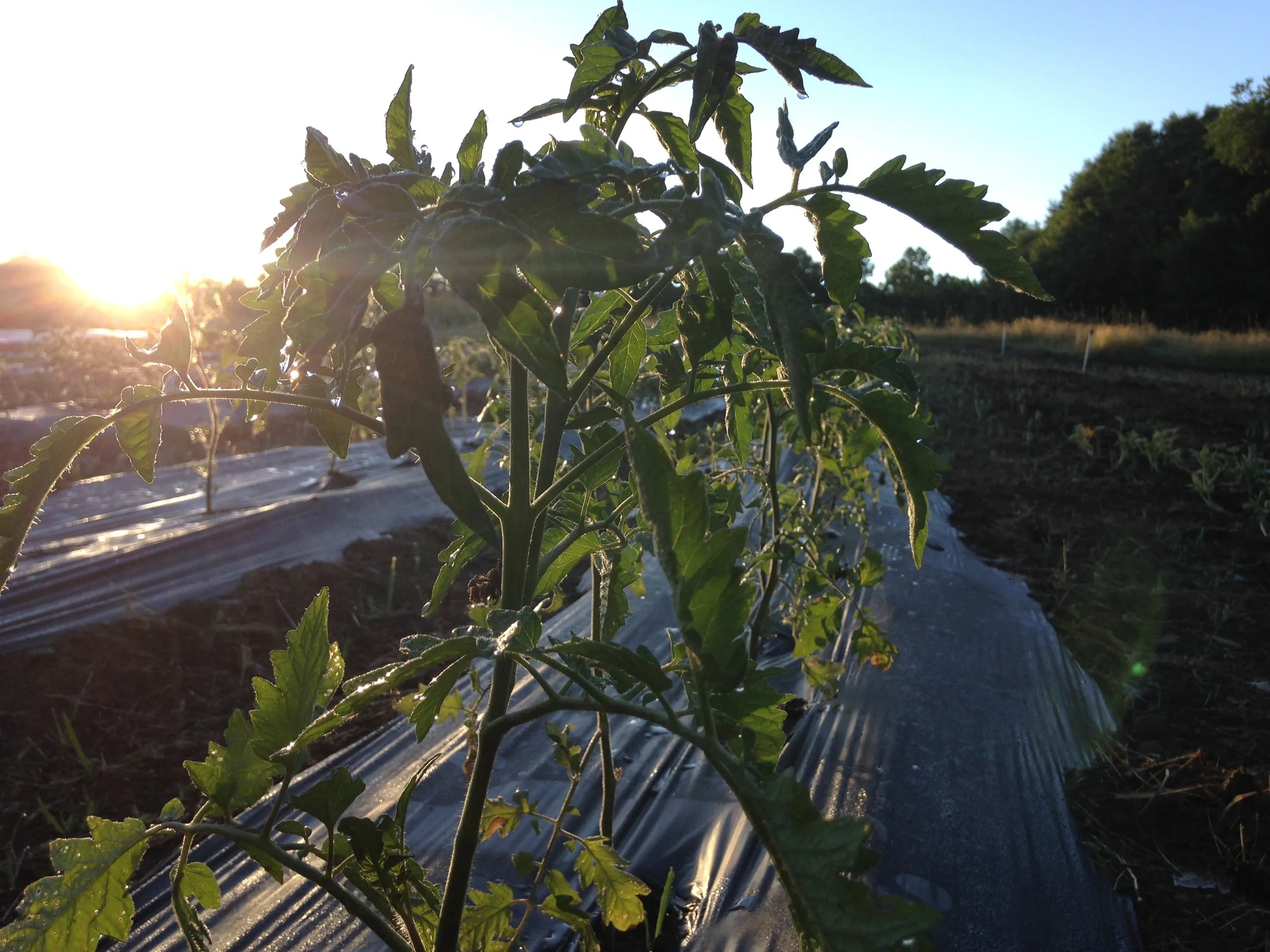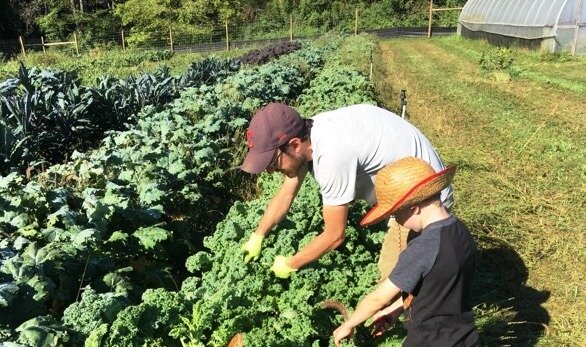One night, Jason and I once had a conversation in the kitchen that I’ve returned to during my lowest points as a farmer. Back in those days, he listened to farming podcasts almost every day, and he’d report back the most interesting stories. His favorite was the Farmer-to-Farmer podcast, hosted by the late Chris Blanchard. The Ruminant was another good one. These podcasts were like fuel in our earliest farming years. Without them, we may not have kept going during the hardest times. That’s because the farmers who shared their stories didn’t just talk of their successes, they also let us peek into past wounds. The hard stuff. The embarrassing stuff. The real stuff. They revealed their failures to us so we might do better, and they showed us we weren’t alone in our struggles.
On that evening in our kitchen, Jason was telling me about Blue Moon Community Farm, in Wisconsin. He’d heard about Blue Moon thanks to Chris’s podcast. The farmer’s name is Kristen, and her story struck a chord with Jason. You see, there were several parallels between her history and our currently unfolding situation. The main similarity was that Kristen spent years working a second job while farming. This dual life has been Jason’s situation every season. By day, he works in local government. By evening and by weekend, he farms. For more than half the year, he works around 90 hours a week in total. From one season to the next, when it just never seemed to get any easier, I thought about Kristen, and what Jason had told me: after seven years, she was able to quit her second job and farm full time.
In less than a week, another CSA season will have come and gone. Season No. 7. And as I write this, Jason is tucked away in his courthouse office, still working for the county. Clearly, he hasn’t made the leap to the farm yet. So why not?
To answer that question, we need to rewind back to when Jason started the farm as a little backyard operation. At that time, he’d just been hired for an entry-level position with the county. The pay was modest, and it was entirely feasible to build a farm that someday matched the income of his full-time job, so this became the goal.
Then, after years of eking by when it came to money, Jason got a major promotion. Now, he was the director of his department, and we could finally catch our breath financially. It seemed foolish to walk away. Besides that, he liked his job and was excited about the new opportunity.
Then, another change came. At that time, I was the managing editor of a local newspaper. After 14 years as a small-town journalist, let me assure you, reporters and editors are motivated by their love of the work and their communities, not by the pay or hours. And the time had come for me to be with my family. In Season 3, I resigned and began life at home and on the farm.
As a one-income family, we found ourselves struggling to get ahead once again. Even the smallest home or car repair, or medical issue, seemed to put us in a bind. We’d never been what you’d call big spenders, and Jason was making a decent income for our part of the country, so what were we doing wrong?
After going through some really rough money patches, we took a ruthless assessment of the situation and our habits. We were brutally honest with ourselves. Upon doing this, we discovered that the answer, as they so often do, was hiding right under our noses.
It was our debt. Plain and simple. We had student loan debt, credit card debt, and car loan debt. We’d bought into the American lie that debt is “normal” your whole life. That it belonged right up there with the main certainties in life: death and taxes. These debt payments and their monthly interest rates were bleeding us dry for years. If you totaled them up, the monthly bill was the clear reason we never felt like we had any money. It was like constantly treading in deep water.
Now that we had a diagnosis of the problem, we drew up a battle plan. We immediately went into what we dubbed a “budget lockdown.” This meant we set a budget at the start of every month, and not a single cent went for anything other than our absolute necessities or paying off bad debt. We applied what’s called the “debt snowball” method. Look it up, it’ll change your life. We also eliminated anything that didn’t reflect the life we wanted to make. We ditched cable TV, unhealthy and pricey meals in restaurants, and useless consumer crap. We made a budget for our life and stuck to it. (Side note: If this interests you, check out the Mr. Money Mustache blog, especially in his early years. I don’t agree with everything he says, but he shoots straight about the toll debt takes. In one post, he wrote that you should think of debt like it’s your head on fire. The mental image of my head engulfed in flames was extremely useful when dealing with spending temptations.)
The student loans were the first to go. Next, credit cards. Then, our car payment. Every time we paid off a debt, we rolled that money into paying off the next one.
After about two years, we were debt free. It felt like we suddenly had wings on our feet.
Now, our monthly bills include: insurances, our house, one cell phone (I haven’t had a cell phone in 15 years), one landline and internet, and electric, plus a few streaming services.
In addition to our bills, we budget every month for groceries and gasoline, and if there’s a special occasion, or we anticipate a specific expense, we set money aside for it. It might sound strict, and I suppose it is, but you can’t put a price on the mental and emotional freedom a budget provides.
As of right now, we live on about one-third of our monthly income, and save the other two-thirds.
So, here’s the magical thing about paying off debt and living on a budget: you realize you don’t need nearly as much money as you thought you did. And this breaks the future wide open.
With all debts paid (minus the house, as mentioned), we now had an exact number for what we needed to live on each year, and we could construct a farm budget to fit our needs.
At first, we set our sights on spring of 2022. Jason would quit his day job right before the start of Season 8. But around this time, Jason began thinking about his unique skill set from his years of county work. He’d become an expert grant writer and had multi-million dollar projects under his belt. Walking away from those talents entirely, and parting with something he enjoyed doing and believed was worthwhile to communities, would be just plain foolish. He decided he wanted to continue doing what he loves about his current job, but on his own terms, and, most importantly, on his own time. Thus, his new company was born: Spark Community Capital. So, in what’s been our hardest season, we now had a new challenge to contend with, Jason using vacation days, evenings, and weekends, to propel Spark forward.
Almost immediately, Spark began to reveal its potential. With this development, we felt safe moving the quit date up. Jason informed his employer that he’d like to be done no later than Jan. 1, 2022. Whenever they’ve found his replacement, he’ll continue with the county on a limited, as-needed capacity, helping with a long-term revitalization project in downtown Oil City at 100 Seneca (Cornplanter Square - this project is awesome, check it out). But he’ll be a free agent otherwise.
So do you know what this means?!? Jason will be joining the farm next season!!! It sounds odd to say he’ll be “joining” the farm, since he’s already such a crucial part of the operation, but now he won’t be squeezing his farm work in until the sun goes down, or in many cases, long after it’s set.
Now, you might be thinking, “Won’t you be in the same boat?” What about Spark? Won’t he still be working two jobs? Technically, yes, but Spark will supplement our income and help us continue to build our savings and (finally) start investing. And we’re building schedules for us both that keep Spark time and farm time and my other pursuits in check. No more 90-hour weeks. We’re ready to be the farm family we’ve wanted to be.
Isn’t it interesting, all the turn of events - the plot twists - that make up a life? The best outcomes have happened when we’ve followed our hearts and led with our conscience. That’s why my mind always returned to that conversation in the kitchen, when Jason first told me all about Blue Moon. It was his way of asking me to believe in him, and to believe in us. To trust the process and the hard work and long hours. That conversation was his way of asking me if I was willing to embark on the journey with him. With our destination drawing near, we can see new journeys on the horizon. My answer remains the same. I’m ready. Let’s go.
~ Stella
“ Tell me, what is it you plan to do with your one wild and precious life?”

